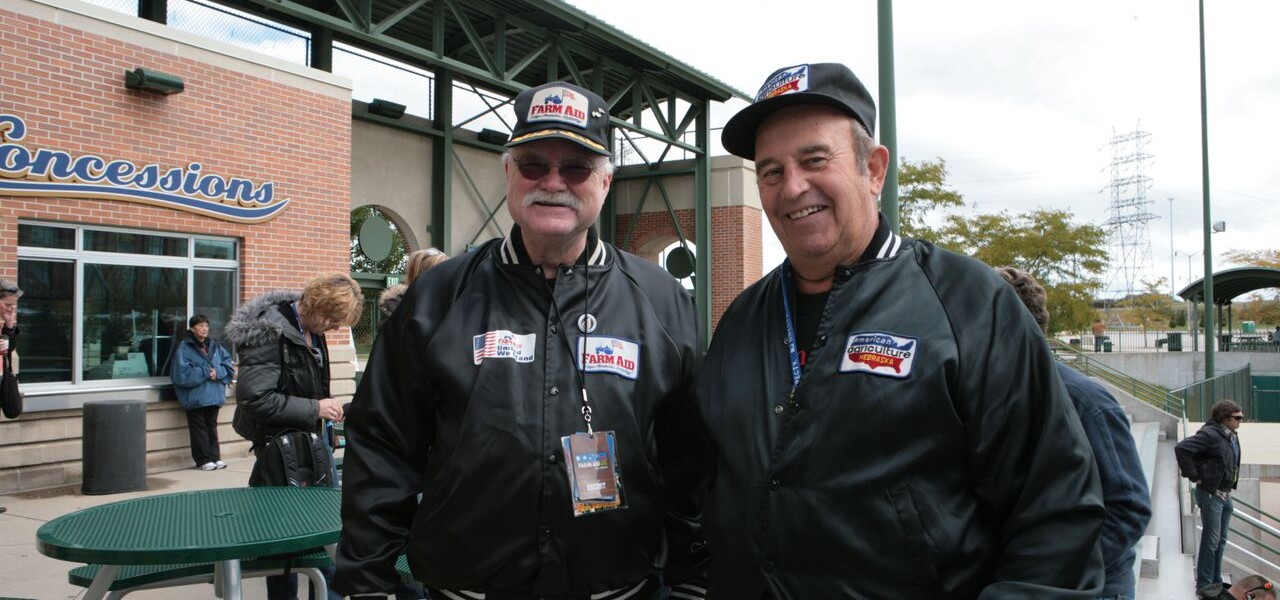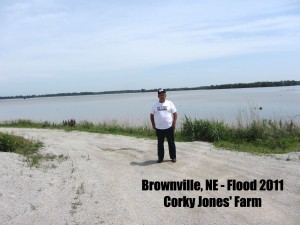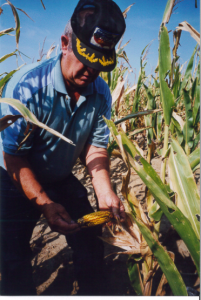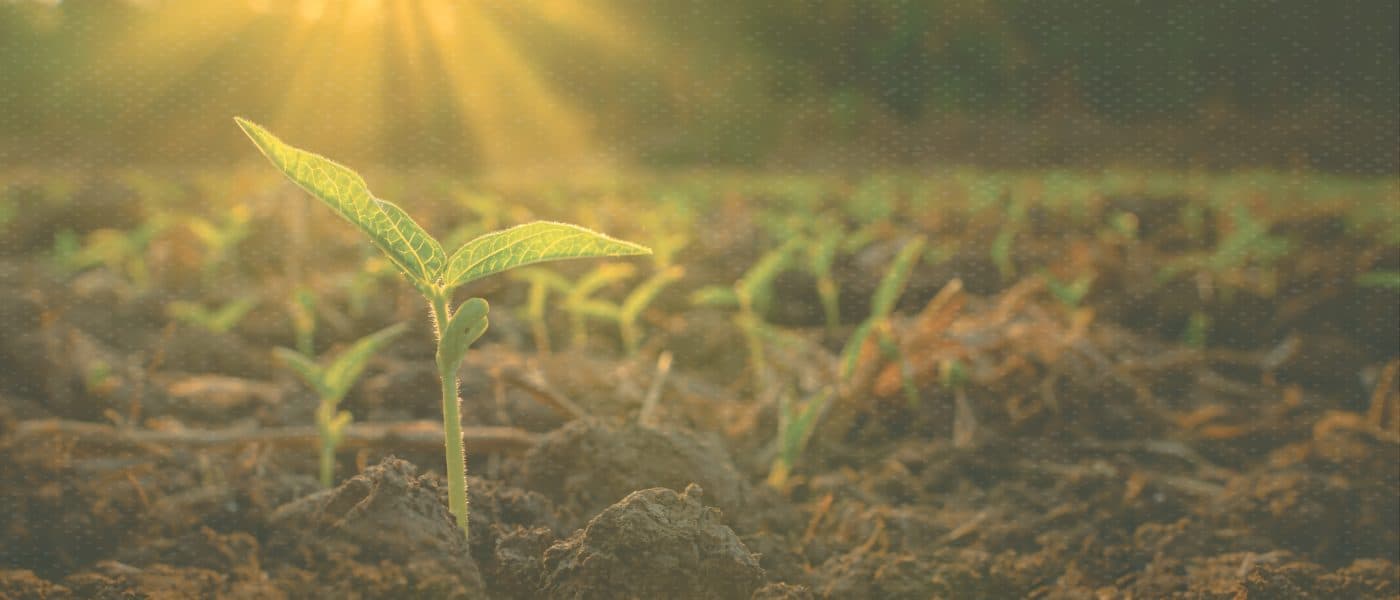Brownville, NE
Corky Jones, former president of American Agriculture Movement and dedicated Farm Aid supporter, talks about the financial difficulties farmers face even in times of high grain prices.
Corky Jones is a “lifetime farmer,” and has taken only four years out of his career to serve his country in the Navy. The Corky Jones and Sons farm is located in Brownville, Nebraska, where Corky and his three boys raise soybeans and corn. “When you talk about a family farm operation, well, that’s us,” Corky explains; he is a fourth generation farmer making his sons the fifth.
Four families farm the Jones’ 2,800-acre farm. Corky explains the acreage might sound like a lot, but it’s about 700-acres per family. The land is not divided—it’s shared and “every acre is a part of each one of us.” Corky wants people to understand that family farms are producing safe food and caring for the air, streams and soil because it is where the farmers’ and their families live.
Currently, Corky is busy with spring work and prepping the grounds to plant after a long and tough winter. Almost half of their farm is located at the bottom of the Missouri River where three “100 year rains” have occurred in the past ten years. Repairing levees and fixing drainage that has been washed out from floods
have taken up Corky’s days recently. But he’s looking forward to planting his crops soon.
Each season before planting, Corky thinks to himself, “This is going to be the best year of my life.” His favorite thing about being a farmer is working the dirt and facing the challenges of preparing the field. After the hopeful act of planting seeds, Corky enjoys watching everything grow and making improvements each year building off past mistakes and successes.
In 1979, Corky’s activism truly began when he joined more than 6,000 farmers in Washington, D.C. to protest U.S. farm policy. Over the course of 21 days, Corky led tractors 1,300 miles from the Midwest to D.C. to get the attention of the public and policymakers by doing something “absolutely different.” Farmers involved in the Tractorcade and protest demanded parity, meaning they wanted to earn at least what they spent to grow their crops—not an unreasonable demand. Today, even amidst high crop prices, farmers are still fighting for that fair price.
Corky spent ten days in D.C., talking to senators and representatives about the truth and struggles of farming. He admits he was nervous the first few days, thinking he wouldn’t fit in among our nation’s leaders, but later realized how important it is for farmers to speak up. On his tenth day, his wife called from his home in Nebraska, and he knew that that “it was time to go.”
As Corky knows far too well, farmers’ earning a fair price and a profit can be extremely difficult—even in times of high prices. Corky thinks that many don’t understand that when prices of food and produce go up, farmers are not the ones making that extra money. “You could double the price of a loaf of bread and farmers would still get just pennies,” Corky explains. The way our complicated and increasingly concentrated food system is structured leaves what farmers earn out of the farmers’ control, benefiting middlemen like processors, marketers and distributors instead.
While the media calls attention to high farm prices when they occur, to truly analyze the profits of a farmer, you must look at market conductions and production costs for more than just a year. Currently, diesel fuel is approaching $4 a gallon and has almost doubled in the last year. Quality seed corn is up to $300 a bag, which only covers about 3 acres. Between fuel, seed and other production costs going up, most farmers have barely noticed the higher price of crops.
Having fair and stable prices is just as important in farming as having stability in any other profession. Every day, crops are bid on and prices change constantly, along with the farmers’ paycheck. Most people don’t have their paycheck on the line like that. Corky explains, “Farmers can’t sit down and figure out a balanced platform for budgeting for the year.” Years ago Corky, his three sons and wife all worked other jobs just to keep their farm alive. As Corky explains they “subsidized their farm with off-farm labor” and this is the reality of many farmers across the nation.
Corky has always believed that there are three things farmers’ need: “Price, price and price. Not from the government, not from taxation, but from those who purchase the products farmers grow.”
Corky has remained an outspoken farmer all his life. After the 1979 Tractorcade in D.C. he served as vice president for the American Agriculture Movement for four years and stood in as president for one year in the early ’80s. In 1985, Corky was invited to Champaign, Illinois, before the first Farm Aid concert. At the time, hundreds of thousands of farmers were forced to move off their land because of failing farm policies and falling farm prices. Farm Aid organizers met with farmers to find out what was really going on in the farm world and what they could do to help.
Since that first Farm Aid concert, Corky has attended every year since then and has often sat down with Willie Nelson and Neil Young to discuss what is going on in the countryside. Corky admires Willie Nelson’s values and how he keeps in touch with farmers like himself. Corky describes Farm Aid as a “catalyst to get the word out” and feels “the best thing about Farm Aid is how it has given farmers the voice to be heard about what farmers, ranchers and production agriculture really does and how important it is to everyone.”
Well, Corky, we think the best thing about Farm Aid is working with farmer heroes like you!
Further Reading
Recognize the people in the photo? Corky is with Farmer Hero David Senter at Farm Aid 25 in Milwaukee, Wisconsin and this photo was taken by Farmer Hero Kim Buchheit!





